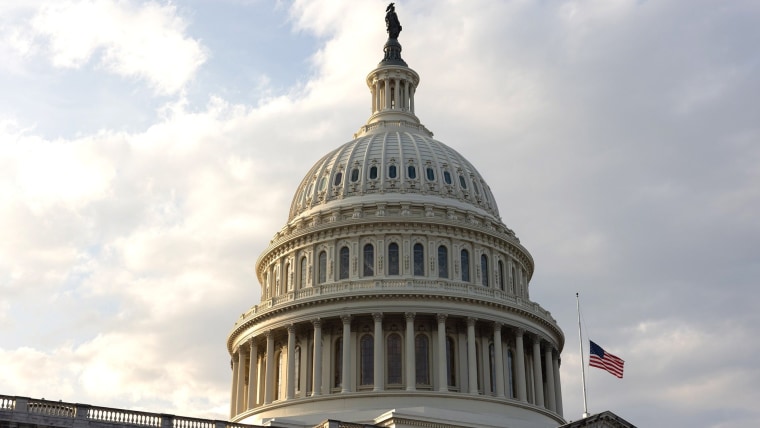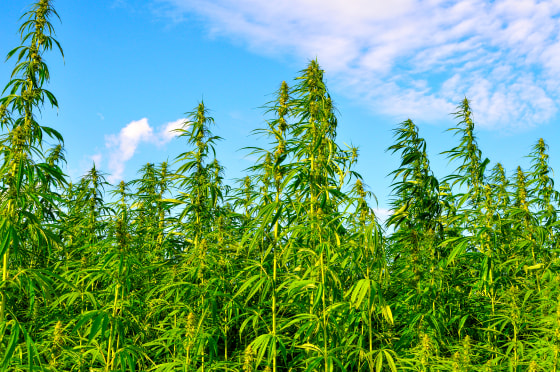WASHINGTON — Though Congress appears to have a deal to end the government shutdown, a vote on that agreement is being held up by an unexpected issue: hemp.
Sen. Rand Paul, R-Ky., is objecting to speedy consideration of the bill that would end the longest shutdown in U.S. history over a hemp provision tucked into funding for the Agriculture Department, three people familiar with conversations but not authorized to discuss them publicly told NBC News.
The provision would close the so-called hemp loophole created by the 2018 Farm Bill that has allowed unregulated THC products to be sold around the country, irrespective of state cannabis laws. Paul has long pushed to keep the loophole and told GOP leadership and hemp industry insiders that he wouldn’t give his consent to speed up passage of the government funding legislation unless the loophole is preserved, according to two of those people.

A spokesperson for Paul, who has voted against federal funding bills for a majority of his 15-year career in the Senate, told NBC News: “Dr. Rand Paul affirms his commitment to reopening the government without delay. However, he objects to the inclusion of provisions in the government-funding package that unfairly target Kentucky’s hemp industry—language that is unrelated to the budget and the government-reopening goal."
"Dr. Paul will work to ensure that the final bill excludes this unrelated language to defend the livelihoods of Kentucky farmers, hemp processors, and manufacturing jobs," the spokesperson continued.
Paul's opposition to the hemp provision is not enough to prevent Congress from passing legislation to reopen the government. But he can slow it down for several days, forcing the Senate to run through procedural hurdles before approving the bill.
The agreement to end the shutdown announced Sunday represents a collaboration between a group of Democratic senators and Republicans. It is expected to pass the Senate and the House before heading to President Donald Trump's desk for his signature to reopen the government.
Trump said Monday afternoon he supports the deal and expects the government to reopen.
Asked about Paul's objection, a White House official told NBC News that Trump “supports the current language in the bill on hemp."
If enacted and signed into law, the hemp provision would mean hundreds of now-legal THC products — most commonly sold as Delta-8 or Delta-9 — would no longer be legal to sell. It is currently federally legal to sell hemp-derived THC products as long as they contain no more than 0.3% THC by dry weight. The language in the new legislation imposes a total THC limit of 0.4 milligrams and would effectively ban those products for personal or household use.
Pressed by reporters Monday, Paul blamed Sen. Mitch McConnell, his fellow Kentucky Republican and former Senate GOP leader, for the provision.
"The legislation as written, has language in it from Sen. McConnell that would destroy the hemp industry. We have hemp farmers in our state," Paul said.
McConnell advocated for the hemp provision in 2018 but has since soured on the law. At a Senate markup this year, McConnell said the legalization of hemp in that bill has resulted in “an unintended consequence that has allowed for intoxicating hemp-derived synthetic products to be made and sold."
Since that law was signed by Trump during his first term, the industry has ballooned to more than $28 billion, according to data from 2022.
Paul suggested that “leadership is fine” with allowing his amendment to strike the hemp language to receive a vote on the Senate floor ahead of final passage of the package to fund the government, referring to McConnell's successor, Senate Majority Leader John Thune, R-S.D.
Sen. Markwayne Mullin, R-Okla., doesn’t believe Paul should get a vote on his amendment. “I'm in the camp of we don’t give him a vote on it. I don’t see the point in it. If Rand wants to plant his flag and hold the government shut down over hemp and Kentucky, take that fight on, I think he’s in— I think he’ll lose that one pretty hard,” he said.
Top Senate appropriator Susan Collins, R-Me., told reporters on Monday her “preference would be that he withdraw his amendment," referring to Paul.
Collins said there is “strong support” for the inclusion of the hemp language in the funding bill. “We’ve also got 38 attorneys general from states all over the nation, liberal states, conservative states. The state of Maine is one asking for us to enact this legislation," she said.
Separately, the Drug Enforcement Administration and the Justice Department are still weighing whether to reclassify cannabis as a lower-level drug at the federal level — a process that began under the Biden administration. In 2024, the DEA moved to reschedule cannabis from Schedule I to Schedule III, for the first time acknowledging the drug’s potential medical benefits and that it is not as harmful as Schedule I and II drugs, which include heroin and LSD.
A new poll from Gallup released this month finds U.S. support for legal marijuana has dwindled in Trump’s second term, particularly among Republicans, with just 40% of the party saying they think recreational marijuana should be legal. Still, 64% of Americans, regardless of political party, support marijuana legalization.


